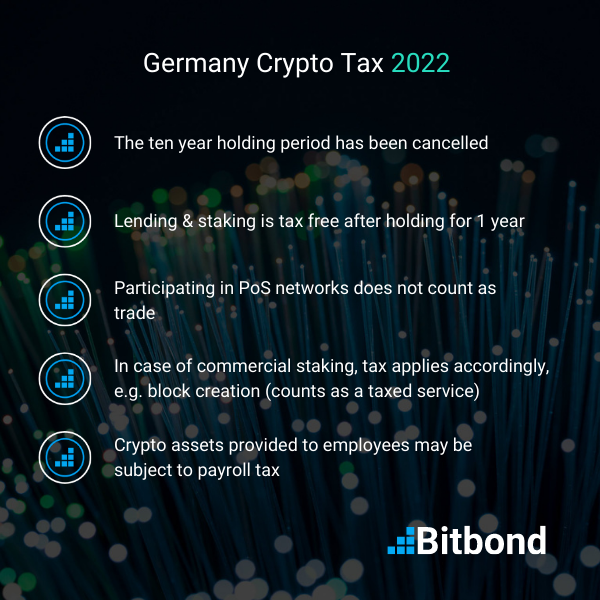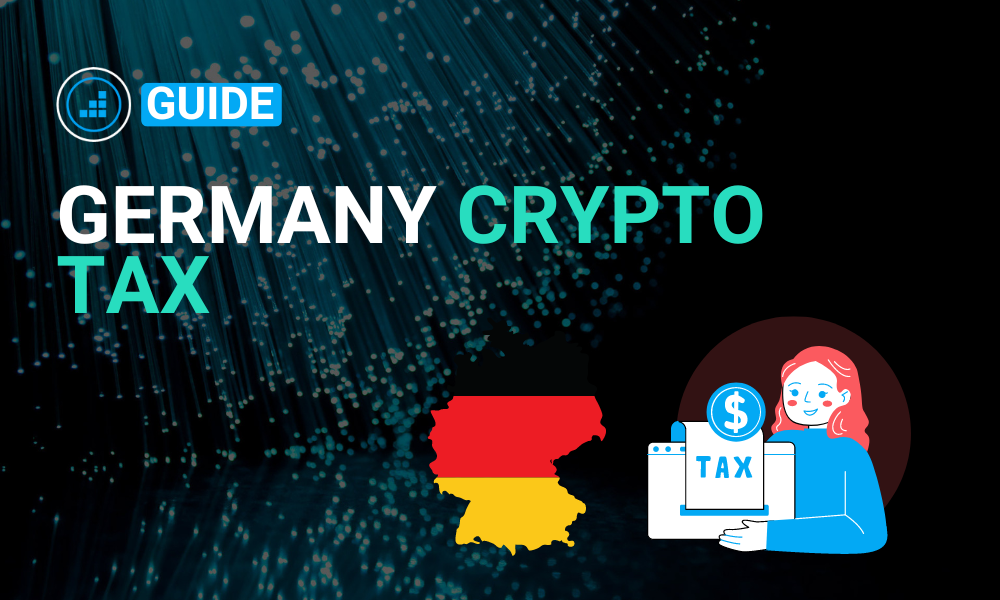German Ministry of Finance: Crypto remain tax-free after one year
Table of Contents
The German Federal Ministry of Finance (BMF) published a circular on the income tax treatment of virtual currencies and crypto tokens. The circular provides the tax authorities with binding rules for all open tax assessments regarding the taxation of income from and in connection with virtual currencies and crypto tokens. It will significantly influence the development of blockchain-based business models in Germany.
Topics of particular interest are:
- The holding period for staking or lending
- The distinction between trading and mere asset-managing income for staking
- The acquisition of reward tokens
- The timing of taxation for employee participation programs
According to the new Germany crypto tax publication, “For private individuals, the sale of acquired Bitcoin and Ether is tax-free after one year. The period is not extended to ten years even if, for example, Bitcoin were previously used for lending or the taxpayer provided Ether to another person as a stake for the latter’s block creation.”
Parliamentary State Secretary Katja Hessel
Summary of Germany’s Crypto Tax law

Crypto tax on holding period for crypto assets in staking or lending
The extension of the holding period for taxable disposals of up to ten years does not apply to cryptocurrencies. The BMF also includes Staking and Crypto Lending in its assessment that the holding period will not be extended to ten years.
In principle, the disposal of crypto tokens is taxable, even if the crypto tokens are held as private assets for tax purposes.
However, such transactions are only taxable if they occur within one year after the acquisition of the crypto-assets. According to the circular, this basic rule also applies to crypto-tokens that were used prior to the disposal. In a first draft version of the circular, the BMF had argued that staking would extend the period for taxable disposals to ten years.
Under the circular, both staked crypto tokens and reward crypto tokens can be disposed of free of taxation after the described holding period of one year. The same applies to crypto tokens that were used to extend credit prior to their disposal. Although the circular refers to virtual currencies, this is not intended to restrict currency tokens. According to BMF, utility tokens that are used as a means of payment (hybrid tokens) are also treated as currency tokens.
The BMF’s change in its point of view on the holding period for staking or lending is well appreciated throughout the crypto industry. It recognizes that the proof-of-stake consensus mechanism or crypto lending does not constitute tax avoidance.
Distinction of trade or business of asset management regarding staking
The circular furthermore clarifies that participation in the proof-of-stake consensus mechanism does not automatically constitute a trade. For German tax purposes, staking is considered private asset management. Only in exceptional cases can staking be considered a commercial activity. This may be the case if users are involved in the creation of new blocks for the blockchain, e.g. validators.
If staking were a commercial activity, the staked tokens and the staking rewards would be attributed to the taxpayer’s business assets. A sale of these tokens would then also be a taxable transaction, regardless of the holding period. In addition, the sale would be subject to trade tax.
The BMF rejects such a qualification for “passive” use (e.g. as an agent). As a rule, the deployment is regarded as pure asset management. The assignment remuneration is therefore attributed to private assets for tax purposes.
At the time of their allocation (entry in the wallet), they are taxable as other income, regardless of whether the deployment premiums were exchanged for fiat currency (dry income taxation). The decisive factor for taxation is the exchange rate at the time of receipt in the Staker’s Wallet.
A sale of the stake premiums is generally only taxable within one year after receipt. However, the BMF considers income from business operations in connection with staking to be possible if the users participate in the creation of new blocks for the blockchain.
According to the BMF, the block creation can be qualified as a service (provision of computing power) to other users. Under German tax law, the provision of services generally qualifies as a trade or business.
The crypto tax treatment of staking thus depends on further circumstances of the individual case and the concrete design of the staking algorithm.
Crypto tax in the context of reward acquisition
The BMF advocates a broad definition of “acquisition”. This indirectly expands the scope of taxable disposals of crypto-tokens held as private assets.
According to the BMF, crypto-tokens are deemed to have been acquired for consideration if they were acquired from third parties in exchange for other crypto-tokens or fiat currency. Crypto-Tokens from mining or staking as well as crypto-Tokens allocated to the taxpayer in the context of crypto-lending, airdrops or ICOs are also considered to be acquired for consideration.
An acquisition for consideration is a prerequisite (in the case of assets held as private assets for tax purposes) for a subsequent sale of the crypto-tokens to be taxable if it takes place within one year of the acquisition. If, for example, there is no acquisition for consideration in the case of deployment premiums, the deployment premiums could be sold tax-free within one year of receipt.
Crypto tax for employee token programs
If Crypto-Tokens are transferred to employees at a reduced price or free of charge, the Crypto-Tokens are considered a taxable benefit in kind, which may be subject to payroll tax. The taxable receipt by the employee generally occurs when the crypto-tokens are transferred to the employee’s wallet, provided the crypto-tokens are tradable at that time. Taxation may occur earlier if the employee has assigned the right to the crypto-tokens to a third party for consideration.
In an earlier draft, the BMF additionally required that the crypto-tokens be listed on a crypto exchange or be usable as a means of payment before a taxable inflow can arise. However, this view contradicted the established case law of the German Federal Fiscal Court on taxable accruals in employee stock option programs.
It led to considerable legal uncertainty for both the employee and the employer, who are obliged to withhold income tax. However, legal uncertainty remains with regard to the criterion of tradability. Under precedent case law, it should be sufficient that the crypto tokens are transferable and that the employee bears the economic risks and rewards of the future performance of the crypto tokens.
Due to the decentralized nature of the blockchain, crypto-tokens can be transferred directly between wallets without the need for the crypto-tokens to be listed on a crypto exchange. In this respect, tradability needs to be interpreted as transferability or usability of the crypto-tokens.
Further perspectives on Germany’s new crypto tax
The paper is a valuable contribution to legal certainty in the taxation of crypto-tokens in Germany. It is positive that the BMF no longer sticks to the extension of the holding period for staking and lending, and applies the general taxation principles for taxable deferrals for employee token programs.
Overall, the Circular is an important milestone for the taxation of blockchain-based business models.




